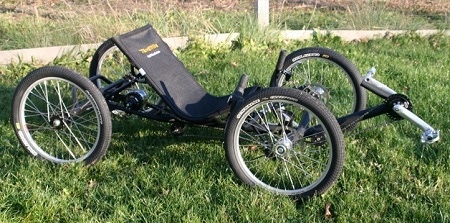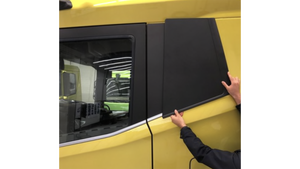Fused deposition modeling (FDM) carbon fiber-filled Nylon capable of replacing metal, while new extra-flexible, tear resistant material family can withstand repeated flexing without tearing or deforming.
May 2, 2017

Stratasys Ltd. has added two new advanced materials to its slate of 3D printing materials: FDM Nylon 12CF - a carbon fiber-filled thermoplastic strong enough to replace metal components in a range of applications, and, for the PolyJet liquid curable photopolymer process, Agilus30 - a new line of high-durability flexible materials that can withstand repeated flexing without tearing or deforming.
The first high-performance composite material available for Stratasys FDM technology to potentially replace a range of metal applications, FDM Nylon 12CF is ideal for rapid prototyping, strong, light-weight tooling and end-use parts.
Containing 35 percent chopped carbon-fiber by weight, FDM Nylon 12CF offers the best stiffness-to-weight ratio among Stratasys FDM thermoplastics, meeting functional performance testing demands in automotive, aerospace, recreational goods, and industrial manufacturing sectors.
Stratasys says that FDM Nylon 12CF will be of special interest for the following users and use cases:
• Design engineers that need to rapidly produce strong, light-weight and rigid components for functional prototyping, thus reducing new product time-to-market.
• Manufacturing engineers that produce manufacturing aids, such as jigs and fixtures, where high material stiffness and strength is required and there is great benefit to the significant weight savings over metal tooling components.
• Design engineers making low-volume production parts with unique structural requirements, where high strength in one-direction is required.
|
Beta customer Utah Trikes is using the carbon fiber-reinforced polyamide grade from Stratasys to fabricate customized components for its recumbent cycles. |
FDM Nylon 12CF beta customer Utah Trikes is taking advantage of the material’s properties throughout its development and production process to make significant cuts to its product development times. The company is a manufacturer of tadpole recumbent tricycles.
“The excellent strength and stiffness-to-weight ratio of the FDM Nylon 12CF material is a game changer for us. It means we can prototype almost every part of our product on Stratasys FDM 3D Printers in under two weeks, where in the past it could take us over two months,” said Ashley Guy, president and CEO of Utah Trikes.
“I no longer have to constrain my designs because of prototyping limitations. Now I can focus on designing better, more functional parts without worrying about how to shape the aluminum or how to lay up carbon fiber onto the molds. Stratasys FDM Nylon 12CF parts can be 3D printed faster, with superior stiffness-to-weight performance and with better repeatability than any other 3D printing technology or vendor we’ve seen,” continued Guy.
Chat with Stratasys at booth 1737 and stay on top of plastics processing trends and business opportunities at PLAST-EX, part of Advanced Design & Manufacturing Expo, in Toronto on May 16 to 18. Go to the event website for more information and to register to attend. |
“We believe that the impressive strength-to-weight ratio of the FDM Nylon 12CF is transformative for many industries from consumer goods and recreational goods to automotive and aerospace,” said Zehavit Reisin, VP, Head of Rapid Prototyping for Stratasys. “It enables designers to develop more practical and functional designs and get them to market faster, without worrying about how to prototype those parts using metal or molding.”
According to Tim Schniepp, Head of Tooling Solutions for Stratasys, “The very high stiffness-to-weight ratio of the FDM Nylon 12CF material makes it extremely well suited for a wide range of final part and manufacturing tooling applications where the combination of stiffness, strength and low weight is critical to the performance. Examples include drill guides, end- of- arm tooling, brackets, jigs, fixtures, and even metal forming tools.”
Expected to begin shipping in Q2 2017, FDM Nylon 12CF is available for the Stratasys Fortus 450mc Production 3D Printer and is compatible with soluble support SR-110. It requires an updated version of Insight software and a hardware upgrade. The material can produce parts in a layer thickness of 0.010 in. (0.254 mm).
In the second material development at Stratasys, the Agilus30 family of materials, consisting of Agilus30 and Agilus30 Black, is created for designers and engineers that need to simulate flexible or rubber materials. The materials enable greater freedom to handle and test flexible parts and prototypes while delivering superior accuracy, fine details and enhanced product realism.
Reportedly an excellent choice for modeling delicate parts that undergo repeated flexing and bending, the Agilus30 family’s all-around rubber-like performance and compatibility with soluble support SUP706 is expected to be of interest to mechanical engineers, rapid prototyping managers and industrial designers according to Stratasys .
Examples of applications benefitting from Agilus30 include over-molding, soft-touch and living hinges, hoses, seals and gaskets, as well as knobs, grips, pulls, and handles. Agilus30 can also be combined with additional materials to create a wide range of digital materials with varying Shore A values, shades and colors.
About the Author(s)
You May Also Like





